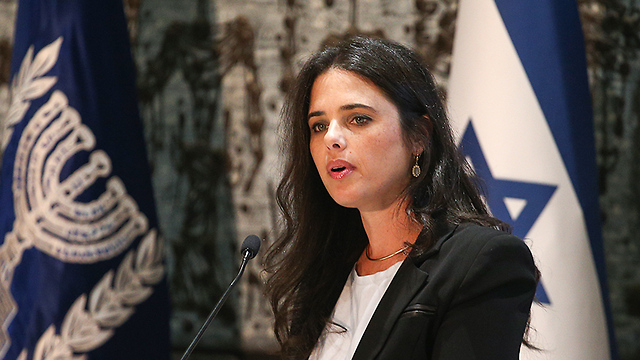Outgoing Justice Minister Ayelet Shaked (HaYamin HeḤadash) said Sunday that, if reappointed to her post, she will seek to appoint Israel’s first ḥaredi judge to the Supreme Court.
“It’s illogical that an entire sector of society is not represented,” she said.
Speaking from a Tel Aviv conference organized by We Women, Shaked said that although she and Education Minister Naftali Bennett have moved from the more traditionalist Bayit Yehudi party to the more westernized HaYamin HeḤadash, she is still committed to improving a variety of issues for the ḥaredi community.
Shaked courting the ḥaredi public seems ambitious given Bennett’s record of antagonizing the community.
Upon first entering Knesset as leader of the Bayit Yehudi faction in 2012, Bennett collaborated with Yair Lapid (Blue & White) to pressure Prime Minister Binyamin Netanyahu (Likud) to submit to the demands of both leaders in order to form a coalition.
This led to Bennett supporting Yesh Atid legislation to coerce ḥaredi men into the Israeli army, tainting himself as a political enemy of the community.
Although recent years have seen an increase in ḥaredi enlistment into the IDF, many leadings rabbis and political leaders representing the sector continue to view the army as a tool to culturally coerce their youth away from the culture and values of their community.
The ḥaredi sector is the fastest growing population between the river and the sea and it makes sense that its youth should contribute to the defense of the state. In fact, many scholars would argue military service to be a Torah mitzvah.
The problem, however, is that most politicians – Bennett and Lapid included – have presented military service as something that will change the ḥaredi community in such a way that will open it up to westernization.
But politicians serious about increasing ḥaredi participation in Israel’s national burden should strive to create more frameworks within the IDF for young ḥaredi men to serve the country without feeling their values or culture threatened.
Shaked’s notion of Israel’s Supreme Court including a ḥaredi justice makes sense given the rate at which the sector is growing. As the population increases and becomes more integrated into Israeli society, it would make sense that ḥaredi representation in not only the military but also the state’s ruling institutions would also increase.
Shaked on Sunday actually credited Bennett with helping the ḥaredi sector integrate into higher education by supporting the creation of new, gender-separate educational frameworks to accommodate the socio-cultural sensitivities of the community.
The outgoing justice minister added that while, for strategic reasons, HaYamin HeḤadash does not include any ḥaredi candidates on its list for the upcoming Knesset elections, she and Bennett are committed to fighting harder than the ḥaredi political parties themselves to continue building frameworks for higher education to service the community.





